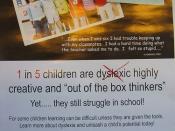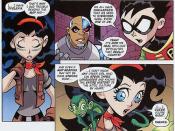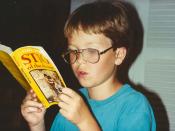Dyslexia
It was not until the National Institutes of Health began to research in 1980 that a more accurate definition of dyslexia was developed. According to the International Dyslexia Association, dyslexia is defined as "a neurologically based, often familially inherited, disorder that interferes with the acquisition and processing language." (Multimedia Schools 8, no6, 2001). Dyslexia affects at least one out of every five children in the United States. It is the most common and prevalent of all known learning disabilities. Dyslexia is "characterized by difficulties in single word decoding, usually reflecting insufficient phonological processing ability and is manifested by a conspicuous problem acquiring proficiency in reading, writing, handwriting, and spelling; and sometimes mathematics" (Multimedia Schools, 2001). Studies have found that no two people with dyslexia are the same. Research has shown that there is a neurological difference between the thinking brains of dyslexics. Some people with dyslexia have significant strengths in areas of the right brain activities such as art, athletics, music, and creative problem-solving skills.
This may be due to dyslexics having a noticeably larger right hemisphere.
Some possible symptoms of recognizing dyslexia in a person would include some, but not all of the following symptoms. A noticeable difference between the person's ability and their actual achievement may be evident with a child who appears to be bright when they are talking to you, but are struggling to deal with the text in reading, spelling or coping with math. Dyslexia may be more common in boys than girls if there is a history of learning difficulties among one or more members of the family. There are two types of dyslexia and the more common dyslexia is inherited through genes. This inherited form of dyslexia is referred to Developmental Dyslexia. Another symptom may include a person having difficulty...


